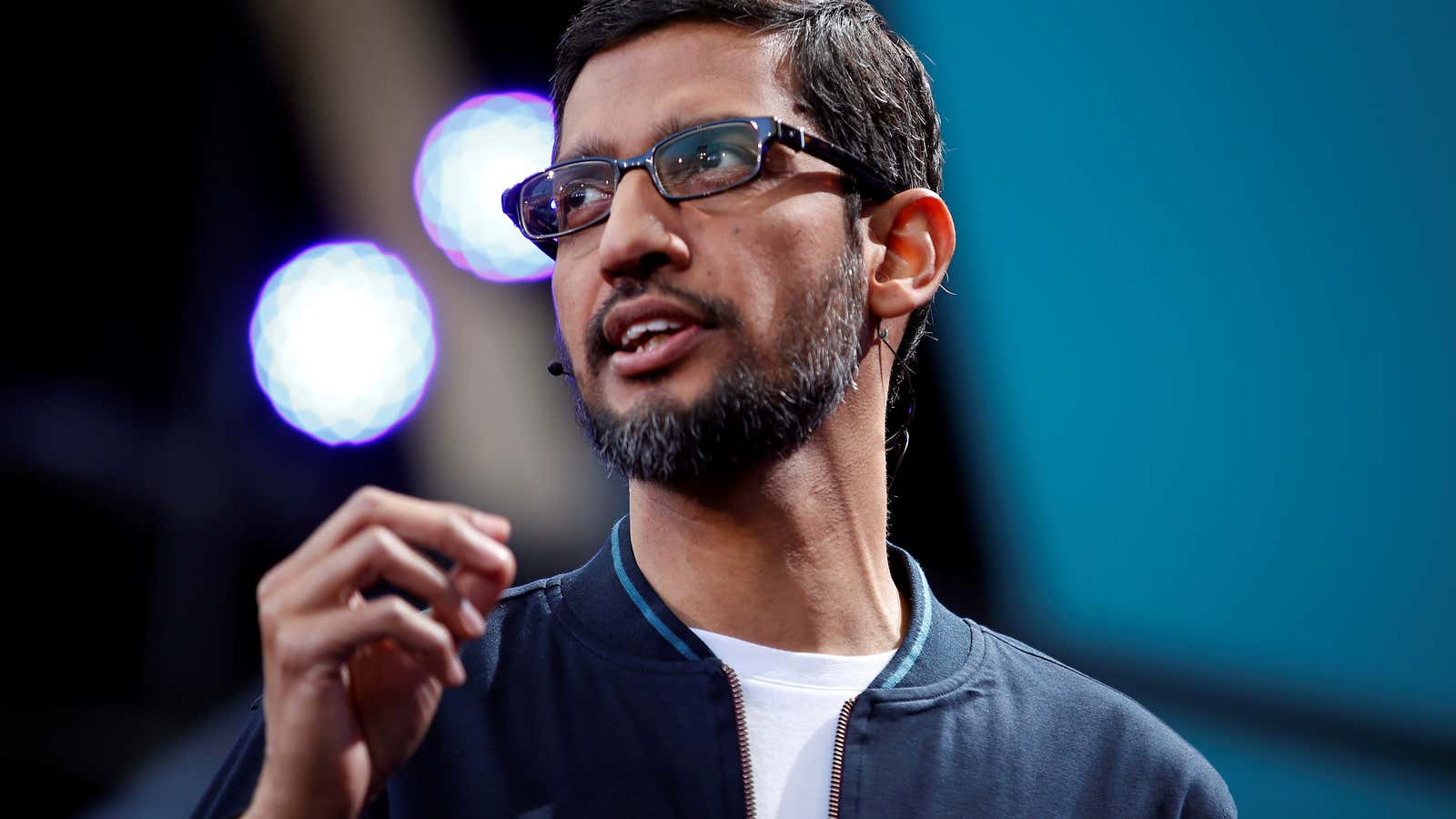If running Google weren’t responsibility enough, its head honcho now has another massive job on his platter: helming Alphabet’s entire business.
On Dec. 3, Google co-founders Larry Page and Sergey Brin announced they are stepping back from their executive roles. Sundar Pichai, who was appointed the CEO of the search business in 2015, will now take the reins of the parent company as well.
“We’ve never been ones to hold on to management roles when we think there’s a better way to run the company. And Alphabet and Google no longer need two (separate) CEOs and a president,” the two wrote in a letter. “Going forward, Sundar will be the CEO of both Google and Alphabet. He will be the executive responsible and accountable for leading Google, and managing Alphabet’s investment in our portfolio of Other Bets.” Page and Brin will continue as board members, shareholders, and co-founders.
Along with passing on the torch, the two co-founders are also leaving Pichai with a laundry list of ongoing troubles.
A-Z of woes
While Google is its biggest subsidiary, Alphabet has over 70 “Other Bets” that it houses under its umbrella.
These are not small, unambitious businesses. Most of them are moonshots. Each company spans a different sector and, by virtue of that, comes with its own baggage.
Jigsaw, for instance, has been accused of harbouring a toxic work environment for women. Waymo is embroiled in a lawsuit with Uber over its self-driving technology. DeepMind, which incurred a $571 million loss last year, continues to bleed.
Alphabet, on the whole, is also in a soup. In July, the justice department announced a broad antitrust review of big tech companies but didn’t name them. Two months later, Alphabet confirmed that it was being investigated and expected future probes from specific US states around the company’s dominant position in digital advertising markets and possible consumer harm. Nearly every state attorney general in the US is coming after the behemoth.
At Google, Pichai has been dealing with a set of troubles, too.
Google carries most of Alphabet’s business on its back. Of the $40.5 billion revenue Alphabet reported for the quarter ended September 2019, $33.9 billion came from advertising across Google Search, Maps, Gmail, YouTube, Google Play, and Google Shopping.
Pichai has been Google’s public face on multiple accounts: meeting with president Donald Trump and then facing his ire over elections, leading Google’s annual developer conference and quarterly investor calls, and defending Google in the US Congress against allegations of anti-conservative bias in a marathon three-and-a-half-hour session.
While Google faces scrutiny from several regulators across the world over its handling of consumer data and disinformation campaigns, Pichai held down the fort. Even while several questions have been raised on the company’s relations with the US military and, separately, with Beijing, he deftly handled pushback from lawmakers, activists, and the media.
This will likely prove to be an asset in his new role, too.
However, there’s a danger of spreading himself too thin. Especially after Alphabet announced nearly $5 billion in acquisitions in recent months, including fitness tracker Fitbit and data analysis firm Looker. The transactions drew sharp criticism from lawmakers and watchdogs.
With his hands full in terms of keeping the wheels of a massive multinational oiled, keeping employees happy is also becoming a task in itself.
Googly-eyed
Pichai, who has been at Google since 2004, is leading a workforce of over 103,000 people. The company has lately been struggling to be transparent and fair.
In August, Google discouraged political discourse on internal mailing lists and forums. More recently, on Nov. 16, Pichai killed Google’s weekly TGIF all-hands meeting due to leaks and unrest.
In October, some employees feared they were being watched via a browser extension on the Calendar app so that Google could quash attempts to organise at the company. The next month, four engineers were fired from Google for allegedly violating its data security policies and code of conduct. However, these ex-Googlers claim they were ousted over dissent and protected labor organizing. Roughly 200 workers even protested the company’s “brute force intimidation” in San Francisco.
Now, as he takes on the reins of Alphabet, the 47-year-old Pichai is taking on more employee-related woes. Top executives at Alphabet are under the scanner over sexual harassment and other misconduct accusations. The closure of subsidiary Waymo’s self-driving car facility in Austin, Texas, left almost 100 contractors jobless with next to no notice. Google’s full-time employees are exempt from signing forced arbitration clauses for sexual harassment and sexual assault claims but Alphabet’s other subsidiaries did not get the same rights, a Verily employee has pointed out.
To add to the mess, the Trump administration has not been kind to foreign talent over the last couple of years. An immigrant himself, issues of immigration have been close to Pichai’s heart.
Like Brin, a refugee from the USSR at the height of the cold war, Pichai has stood his ground against anti-immigrant sentiments. Google, among the highest recipients of the H-1B work visa, has been part of lobbying group FWD.us’s efforts to support immigrants.
“We’re concerned about the impact of this order and any proposals that could impose restrictions on Googlers and their families, or that create barriers to bringing great talent to the US,” the Indian-born Pichai said in an internal memo in response to Trump’s controversial travel ban in January 2017. “We’ll continue to make our views on these issues known to leaders in Washington and elsewhere.”
However, in November this year, Pichai drew some flak for hiring an ex-Trump administration officer who worked on immigration.
With Alphabet in the mix, the balancing act just got tougher.
